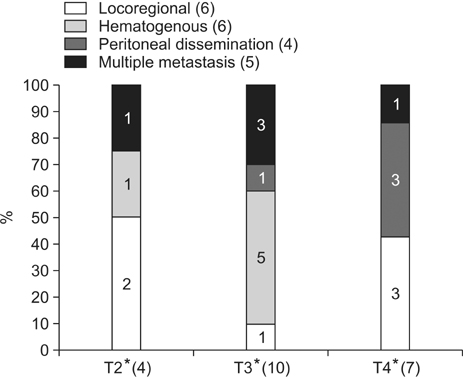J Gastric Cancer.
2016 Sep;16(3):161-166. 10.5230/jgc.2016.16.3.161.
Prognostic Factors for Node-Negative Advanced Gastric Cancer after Curative Gastrectomy
- Affiliations
-
- 1Department of Surgery, Inje University Ilsan Paik Hospital, Inje University College of Medicine, Goyang, Korea.
- 2Department of Surgery, Inje University Seoul Paik Hospital, Inje University College of Medicine, Seoul, Korea. yongaaa5972@naver.com
- 3Department of Internal Medicine, Inje University Seoul Paik Hospital, Inje University College of Medicine, Seoul, Korea.
- KMID: 2372559
- DOI: http://doi.org/10.5230/jgc.2016.16.3.161
Abstract
- PURPOSE
Lymph node (LN) metastasis is the best prognostic indicator in non-distant metastatic advanced gastric cancer. This study aimed to assess the prognostic value of various clinicopathologic factors in node-negative advanced gastric cancer.
MATERIALS AND METHODS
We retrospectively analyzed the clinical records of 254 patients with primary node-negative stage T2~4 gastric cancer. These patients were selected from a pool of 1,890 patients who underwent radical resection at Memorial Jin-Pok Kim Korea Gastric Cancer Center, Inje University Seoul Paik Hospital between 1998 and 2008.
RESULTS
Of the 254 patients, 128 patients (50.4%), 88 patients (34.6%), 37 patients (14.6%), and 1 patient (0.4%) had T2, T3, T4a, and T4b tumors, respectively. In a univariate analysis, operation type, T-stage, venous invasion, tumor size, and less than 15 LNs significantly correlated with tumor recurrence and cumulative overall survival. In a multivariate logistic regression analysis, tumor size, venous invasion, and less than 15 LNs significantly and independently correlated with recurrence. In a multivariate Cox proportional hazards analysis, tumor size (hazard ratio [HR]: 2.926; 95% confidence interval [CI]: 1.173~7.300; P=0.021), venous invasion (HR: 3.985; 95% CI: 1.401~11.338; P=0.010), and less than 15 LNs (HR: 0.092; 95% CI: 0.029~0.290; P<0.001) significantly correlated with overall survival.
CONCLUSIONS
Node-negative gastric cancers recurred in 8.3% of the patients in our study. Tumor size, venous invasion, and less than 15 LNs reliably predicted recurrence as well as survival. Aggressive postoperative treatments and timely follow-ups should be considered in cases with these characteristics.
Keyword
MeSH Terms
Figure
Reference
-
1. Siegel R, Ma J, Zou Z, Jemal A. Cancer statistics, 2014. CA Cancer J Clin. 2014; 64:9–29.2. DeSantis CE, Lin CC, Mariotto AB, Siegel RL, Stein KD, Kramer JL, et al. Cancer treatment and survivorship statistics, 2014. CA Cancer J Clin. 2014; 64:252–271.3. Jung KW, Won YJ, Kong HJ, Oh CM, Cho H, Lee DH, et al. Cancer statistics in Korea: incidence, mortality, survival, and prevalence in 2012. Cancer Res Treat. 2015; 47:127–141.4. Cuschieri SA, Hanna GB. Meta-analysis of D1 versus D2 gastrectomy for gastric adenocarcinoma: let us move on to another era. Ann Surg. 2014; 259:e90.5. Memon MA, Subramanya MS, Khan S, Hossain MB, Osland E, Memon B. Meta-analysis of D1 versus D2 gastrectomy for gastric adenocarcinoma. Ann Surg. 2011; 253:900–911.6. Japanese Gastric Cancer Association. Japanese classification of gastric carcinoma: 2nd English edition. Gastric Cancer. 1998; 1:10–24.7. Washington K. 7th edition of the AJCC cancer staging manual: stomach. Ann Surg Oncol. 2010; 17:3077–3079.8. Kim SS, Choi BY, Seo SI, Jung MY, Choi HS, Ahn SM, et al. The comparison between 6th and 7th International Union against Cancer/American Joint Committee on Cancer classification for survival prognosis of gastric cancer. Korean J Gastroenterol. 2011; 58:258–263.9. Kim JH, Kim CW, Choi NK, Kwak JH, Choi KM, Jang HJ, et al. The comparison between 6th and 7th UICC/AJCC N Stage for prognostic significance in gastric cancer. J Korean Surg Soc. 2010; 79:202–206.10. Imamura T, Komatsu S, Ichikawa D, Kubota T, Okamoto K, Konishi H, et al. Poor prognostic subgroup in T3N0 stage IIA gastric cancer, suggesting an indication for adjuvant chemotherapy. J Surg Oncol. 2015; 111:221–225.11. Adachi Y, Oshiro T, Mori M, Maehara Y, Sugimachi K. Tumor size as a simple prognostic indicator for gastric carcinoma. Ann Surg Oncol. 1997; 4:137–140.12. Kim DY, Seo KW, Joo JK, Park YK, Ryu SY, Kim HR, et al. Prognostic factors in patients with node-negative gastric carcinoma: a comparison with node-positive gastric carcinoma. World J Gastroenterol. 2006; 12:1182–1186.13. Yokota T, Ishiyama S, Saito T, Teshima S, Yamada Y, Iwamoto K, et al. Is tumor size a prognostic indicator for gastric carcinoma? Anticancer Res. 2002; 22:3673–3677.14. Zhang BY, Yuan J, Cui ZS, Li ZW, Li XH, Lu YY. Evaluation of the prognostic value of the metastatic lymph node ratio for gastric cancer. Am J Surg. 2014; 207:555–565.15. He H, Shen Z, Wang X, Qin J, Sun Y, Qin X. Survival benefit of greater number of lymph nodes dissection for advanced node-negative gastric cancer patients following radical gastrectomy. Jpn J Clin Oncol. 2016; 46:63–70.16. Rausei S, Dionigi G, Ruspi L, Proserpio I, Galli F, Tirotta F, et al. Lymph node staging in gastric cancer: new criteria, old problems. Int J Surg. 2013; 11:Suppl 1. S90–S94.17. Dicken BJ, Graham K, Hamilton SM, Andrews S, Lai R, Listgarten J, et al. Lymphovascular invasion is associated with poor survival in gastric cancer: an application of gene-expression and tissue array techniques. Ann Surg. 2006; 243:64–73.18. Lee JH, Kim MG, Jung MS, Kwon SJ. Prognostic significance of lymphovascular invasion in node-negative gastric cancer. World J Surg. 2015; 39:732–739.
- Full Text Links
- Actions
-
Cited
- CITED
-
- Close
- Share
- Similar articles
-
- Prognostic Factors on Overall Survival in Lymph Node Negative Gastric Cancer Patients Who Underwent Curative Resection
- Laparoscopic Surgery for Advanced Gastric Cancer: Current Status and Future Perspectives
- Clinicopathologic Evaluation of Patients with Recurrence of Gastric Cancer within 6 Months after Curative Resection
- Tumor Size as a Prognostic Factor in Gastric Cancer Patient
- Role of Recurrence Pattern Multiplicity in Predicting Post-recurrence Survival in Patients Who Underwent Curative Gastrectomy for Gastric Cancer




